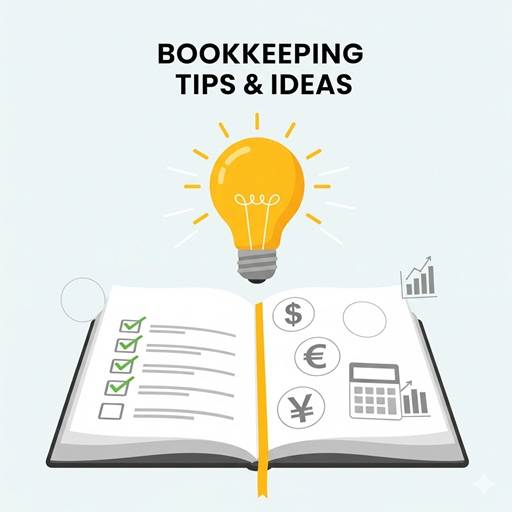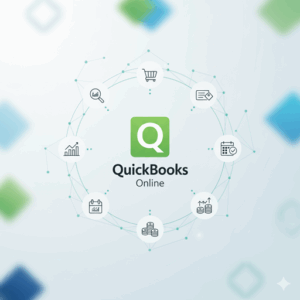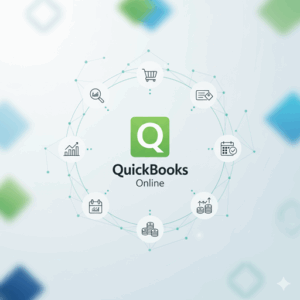Intro: The 5 Best Accounting Software for Small Business
Running a small business is a masterclass in juggling. You’re the CEO, the lead creative, the marketing department, and the janitor. But when you also have to be the accountant, things can get overwhelming fast. If you’re tired of wrestling with spreadsheets and losing sleep over tax season, you’re in the right place.
The truth is, strong financial management is non-negotiable. A U.S. Bank study found that 82% of business failures are due to poor cash flow management. The right software doesn’t just organize your numbers; it gives you the clarity to make smart decisions and the peace of mind to focus on what you do best. This guide will provide a clear, no-jargon breakdown of the best accounting software for small business to help you make a confident choice today.
Quick Comparison: Best Accounting Software for Small Business (2025)
For a quick overview, here’s how the top contenders stack up.
In-Depth Reviews of the Top Accounting Tools
Let’s dive deeper into what makes each of these platforms unique and who they serve best.
1. QuickBooks Online: The All-Around Powerhouse
QuickBooks has been the gold standard for decades, and for good reason. It’s a comprehensive, powerful tool that can handle almost any accounting task you throw at it. From simple invoicing to complex inventory management, it’s built to grow with you.
Pros
- Unmatched Features: Offers the most robust set of features on the market, including detailed reporting, inventory tracking, and project management.
- Scalability: With multiple plan tiers, it can support you from a one-person startup to a fast-growing enterprise.
- Accountant-Preferred: Nearly every accountant in the U.S. knows and uses QuickBooks, making collaboration seamless.
Cons
- Steeper Learning Curve: The sheer number of features can feel overwhelming for complete beginners.
- Higher Price Point: It’s one of the more expensive options, especially as you move up in plans.
Who It’s Best For
QuickBooks Online is best for small businesses that plan to scale. If you anticipate hiring employees, managing inventory, or needing detailed financial insights, investing in QuickBooks from the start will save you a major headache down the road. It’s the undisputed best overall choice.
2. Xero: The Best for Growing Teams
Xero is QuickBooks’s biggest competitor and a fantastic alternative, especially for businesses that value a clean user interface and unlimited users. It excels in collaboration and integrates with a massive ecosystem of third-party apps.
Pros
- Unlimited Users: All Xero plans include unlimited users at no extra cost, making it ideal for teams.
- Clean Interface: Many users find its design more modern and intuitive than QuickBooks.
- Strong Integrations: Connects with over 700 business apps, from Stripe to Shopify, allowing you to build a custom workflow.
Cons
- Limited Customer Support: Phone support is not readily available, which can be frustrating when you need immediate help.
- Mobile App is Less Robust: While functional, the mobile app lacks some of the features of its desktop counterpart.
Who It’s Best For
Xero is perfect for growing teams and businesses that rely on many different digital tools. When comparing QuickBooks vs Xero for freelancers, QuickBooks often wins on features, but Xero’s unlimited user access gives it the edge for partnerships and small agencies.
3. FreshBooks: The King of Invoicing for Freelancers
FreshBooks started as a simple invoicing tool and has evolved into a full-fledged accounting solution designed specifically for service-based business owners and freelancers. Its primary focus is on making it incredibly easy to track time, create beautiful invoices, and get paid faster.
Pros
- Best-in-Class Invoicing: Creating, customizing, and automating professional-looking invoices is incredibly simple. This is top-tier small business invoicing and billing software.
- Excellent Time Tracking: Built-in time tracking tools make it easy to bill clients by the hour and understand project profitability.
- User-Friendly: The platform is arguably the most intuitive and least intimidating on this list.
Cons
- Basic Reporting: While it covers the essentials, its reporting capabilities are not as deep as QuickBooks or Xero.
- Not for Inventory-Based Businesses: FreshBooks is not designed to handle physical product sales or inventory management.
Who It’s Best For
FreshBooks is the best choice for freelancers, consultants, and service-based business owners. If your business revolves around selling your time and expertise, FreshBooks is tailor-made for your workflow.
4. Wave: The Best Free Accounting Software for Startups
Yes, you read that right. Wave offers 100% free, full-featured accounting software. It covers all the essentials—invoicing, expense tracking, and financial reporting—without a monthly fee. They make money through payment processing (similar to PayPal) and payroll services.
Pros
- Completely Free: The core accounting and invoicing software is free forever. There are no hidden fees or trials.
- Unlimited Invoices & Users: Send as many invoices as you need and collaborate with team members at no cost.
- Simple & Easy to Use: Perfect for beginners who just need the basics without a steep learning curve.
Cons
- No Direct Bank Integrations in Some Regions: While strong in the US & Canada, international bank connections can be spotty.
- Limited Scalability: Lacks the advanced features (like project management or inventory) that a growing business will eventually need.
- Ads on the Platform: The free model is supported by ads within the user interface.
Who It’s Best For
Wave is the ideal free accounting software for startups, solopreneurs, and freelancers with simple financial needs. If you’re just starting and want to keep overhead as low as possible, Wave is an unbeatable value.
5. Zoho Books: The Scalable Choice for E-commerce
Zoho Books is part of the larger Zoho ecosystem of business apps. It stands out for its strong automation features, end-to-end accounting, and excellent value, particularly for businesses selling products online.
Pros
- Workflow Automation: Set up rules to automate tedious tasks like categorizing expenses or sending payment reminders.
- Excellent Integrations: Integrates seamlessly with payment gateways and e-commerce platforms like Shopify.
- Great Value: Offers advanced features like inventory management and project billing at a lower price point than competitors.
Cons
- Can Feel Complex: The Zoho ecosystem is massive, and navigating it can be intimidating at first.
- Learning Curve for Automation: Setting up the advanced workflow rules requires some initial effort.
Who It’s Best For
Zoho Books is a top contender for e-commerce businesses and those who want to automate their financial workflows. If you need to know how to choose accounting software for ecommerce, look for strong inventory management and payment gateway integrations—Zoho Books delivers on both.
Final Verdict: Our Top Picks for 2025
Let’s cut to the chase. Which one should you actually choose?
- Best Overall: QuickBooks Online. It’s the most powerful and scalable option that will grow with your business for years to come.
- Best for Freelancers: FreshBooks. Its unbeatable invoicing and time-tracking features are built specifically for your needs.
- Best Free Option: Wave. For new businesses and solopreneurs on a budget, you simply cannot beat its free, full-featured offering.
Bonus: Quick Bookkeeping Tips for New Business Owners
No matter which software you choose, good habits are key.
- Open a Separate Business Bank Account: Never mix personal and business finances. This is the #1 rule of bookkeeping.
- Set Aside Money for Taxes: A good rule of thumb is to save 25-30% of every payment you receive in a separate savings account.
- Review Your Books Weekly: Spend 15-30 minutes every Friday categorizing transactions and checking your cash flow. This small habit prevents massive clean-up jobs later.
Frequently Asked Questions (FAQ)
Do I still need an accountant if I use this software?
Yes, but their role changes. Instead of paying an accountant or bookkeeper for hours of data entry, you’ll use them for high-level strategic advice, tax planning, and filing your annual returns. The software does the day-to-day work; the accountant helps you see the big picture.
How difficult is it to set up and get started?
Most modern accounting software is designed for beginners. The initial setup usually involves connecting your business bank account, customizing your invoice template, and inputting some basic company information. Most platforms offer setup wizards and video tutorials, and you can typically be up and running in under an hour.
Can this software help me with tax preparation?
Absolutely. All of these tools generate the key financial reports your accountant needs for tax filing, such as the Profit & Loss (P&L) statement and Balance Sheet. Many, like QuickBooks, even offer features to help you estimate quarterly tax payments and tag tax-deductible expenses throughout the year, making tax season significantly less stressful.
Hi, I’m [jeybee]. As a long-time resident of Seoul, I’m passionate about uncovering the authentic, everyday magic of Korea. This blog is my way of sharing my favorite spots, tips, and cultural insights with you, beyond the usual tourist traps.




